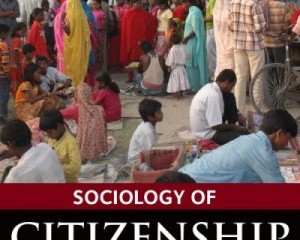
‘Devo Manc’: ‘Northern Powerhouse’ or ‘Northern Poorhouse’?
Centralisation has certainly failed, but the promise of devolution to Greater Manchester is being massively hyped. Manchester is a great world city which has long divided observers. In the mid-nineteenth century, what was for de Tocqueville a ‘foul drain’ and for Taine ‘Babel built of brick’ was for the Edinburgh Review, by contrast, ‘foremost in the march of improvement, a great incarnation of progress’. Most recently, with ‘devo Manc’, the city of 1980s de-industrialisation and indie music has been transmuted into a symbol of post-industrial regeneration and devolved government. All this is being talked up as a matter of electioneering by the Treasury and Westminster politicians. After all, the coalition government must be seen to have a policy on ‘rebalancing …

Decision 2015
The United Kingdom general election is less than a month away, and it is proving to be on a knife’s edge. Only a few percentage points separate the Labour Party and the Conservative Party, and for now no party seems to have a decisive advantage in the polls. Meanwhile, smaller parties such as the Greens, the Liberal Democrats, the UK Independence Party (UKIP) and the Scottish National Party (SNP) could hold the balance of power in a hung parliament after May 2015. What are the predicted outcomes of the upcoming election, and how can we accurately forecast the vote? What would a coalition government look like? How will Britain’s relationship with the European Union develop after May 2015? What is …

Afropolitanism: Global citizenship with African routes
Diasporas and other transnational communities have become particularly useful case studies for scholars interested in stretching and challenging mainstream conceptions of citizenship. It is now widely accepted that for many people around the world, physical location and formal legal citizenship may not be the most salient forms of social, political or economic affiliation. As the process of globalization continues to expand, more and more people find themselves in one place, while their lives are structured and oriented by connections to one or several other places. Some of these ‘places’ are other nation states, such as an ancestral country of origin. However, many such ‘places’ exist extraterritorially as abstract yet powerful expressions of identity, community, and belonging.
Enter Afropolitanism.
In 2005, Taiye Selasi authored a short piece for The Lip Magazine titled ‘Bye-Bye Babar (or: What is an Afropolitan?)’. In it, the British-born, American-raised, writer of Nigerian and Ghanaian origin, formulated a definition and vivid depiction of an ‘Afropolitan’, one that has become the reference point for many enthusiasts and critics alike.

The Cambridge Election Podcast
From the University of Cambridge comes ELECTION, a weekly politics podcast; asking the questions that no one else is in the run-up to the British General Election with the most interesting people inside and outside the political arena. Here below are the sixth and the seventh podcasts.
#6 – Rae Langton on Charlie Hebdo, hate vs free speech & blasphemy
What constitutes hate speech? Does the Press do more harm than good in our democracy? When should words become the government’s business? We put these questions to Professor Rae Langton – award-winning philosopher and the world’s ‘fourth most influential woman thinker’ – and discuss whether free speech can ever be reconciled with a need to suppress hateful voices. The team then discuss the fallout of Ed Miliband’s ‘second kitchen’, whether politicians can – or should – keep their families out of the media spotlight, and the lessons from the Israeli election result.

The Great Charter of Liberties
Looking at the distance between the Westminster parliamentary system and those to whom elected representatives are ultimately accountable, the Chartists had a point – in fact, at least six points. Magna Carta: Law, Liberty, Legacy. The coincidence of the British Library’smagnificent exhibition with a general election campaign is bound to tempt political parties to claim a particular affinity with Magna Carta, or more precisely with what they believe it embodies. As David Carpenter’s new Penguin Classics edition demonstrates (together with the review of it that Peter Linebaugh contributed to this series) – this is a subject still wide-open to contest. Yet this in no way diminishes the significance of previous interpretations, especially those that helped shape past political movements. That great popular movement of the …

Alan Rusbridger: The world after Snowden
The debate over the impact of Edward Snowden’s intelligence leaks has been obscured by “muddle and fog”, particularly in the United Kingdom, according to Alan Rusbridger. The Guardian’s editor-in-chief said the lack of response from British politicians, journalists and the public following the revelations was “very frustrating”. Politicians in the UK have found the subject “toxic”, complex and difficult to discuss, but the issues are too important to be ignored, Rusbridger said. “The penny has dropped recently that, love or hate Edward Snowden, he has laid out a huge canvas of issues that concern us all,” he said. In a lecture, 21st Century Surveillance State: Implications of the Snowden Revelations, at the University of Oxford this week, Rusbridger told his audience it was time to move the debate …

Digital rights and freedoms: Part 2
More than rights, a set of guiding principles is needed to counterpose to the reigning ideals of ‘security’, ‘growth’ and ‘innovation’. Alternative ideals, perhaps, such as democracy, health and environmental sustainability? See part one. The net has the potential to revolutionize democracy with an informed citizenry empowered to deliberate and decide on key issues. Yet current trends strengthen anti-democratic forces. In addition to concerns over privacy, there is an urgent need to address how the public realm is being hollowed out by corporate interests and advertisers. The ideal of democracy presupposes a shared public sphere in which citizens can construct, debate and decide on collective projects. This requires access to quality information and while the net has certainly increased the …

Digital rights and freedoms: Part 1
Under the rubric of state security on the one hand and commercial openness on the other, we are being lulled into an online world of fear and control where our every move is monitored in order to more efficiently manage us. This article launches a new section of the Great Charter Convention dedicated to debate and analysis of democracy, politics and freedom in the digital age. It is clear that we are at a crucial historical juncture. The issues around state power and surveillance raised by Edward Snowden’s revelations should be an important theme in the upcoming general election, while the symbolic double anniversary of Magna Carta (aged 800) and the web (aged 25) offers an opportunity for critical reflection on how …









